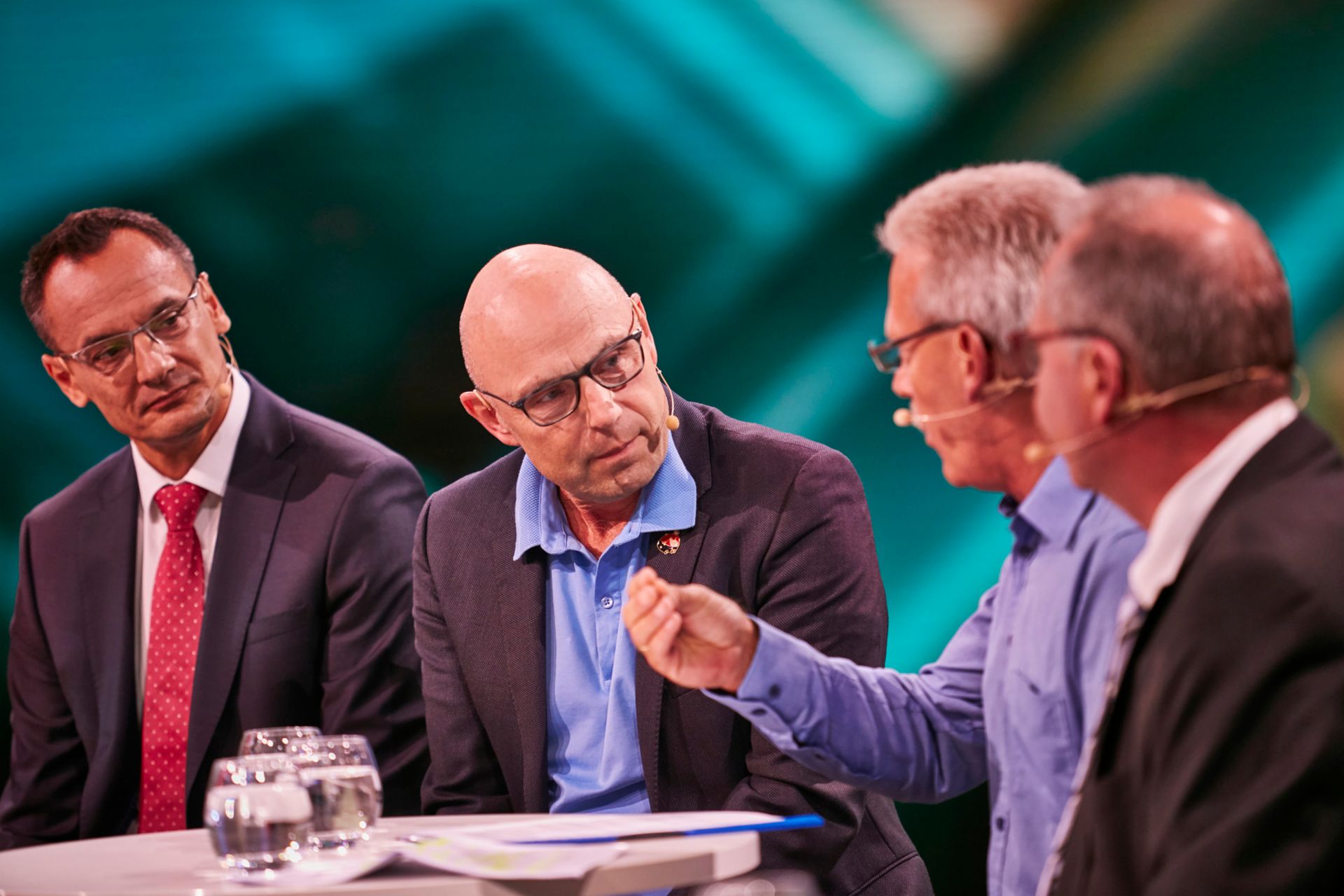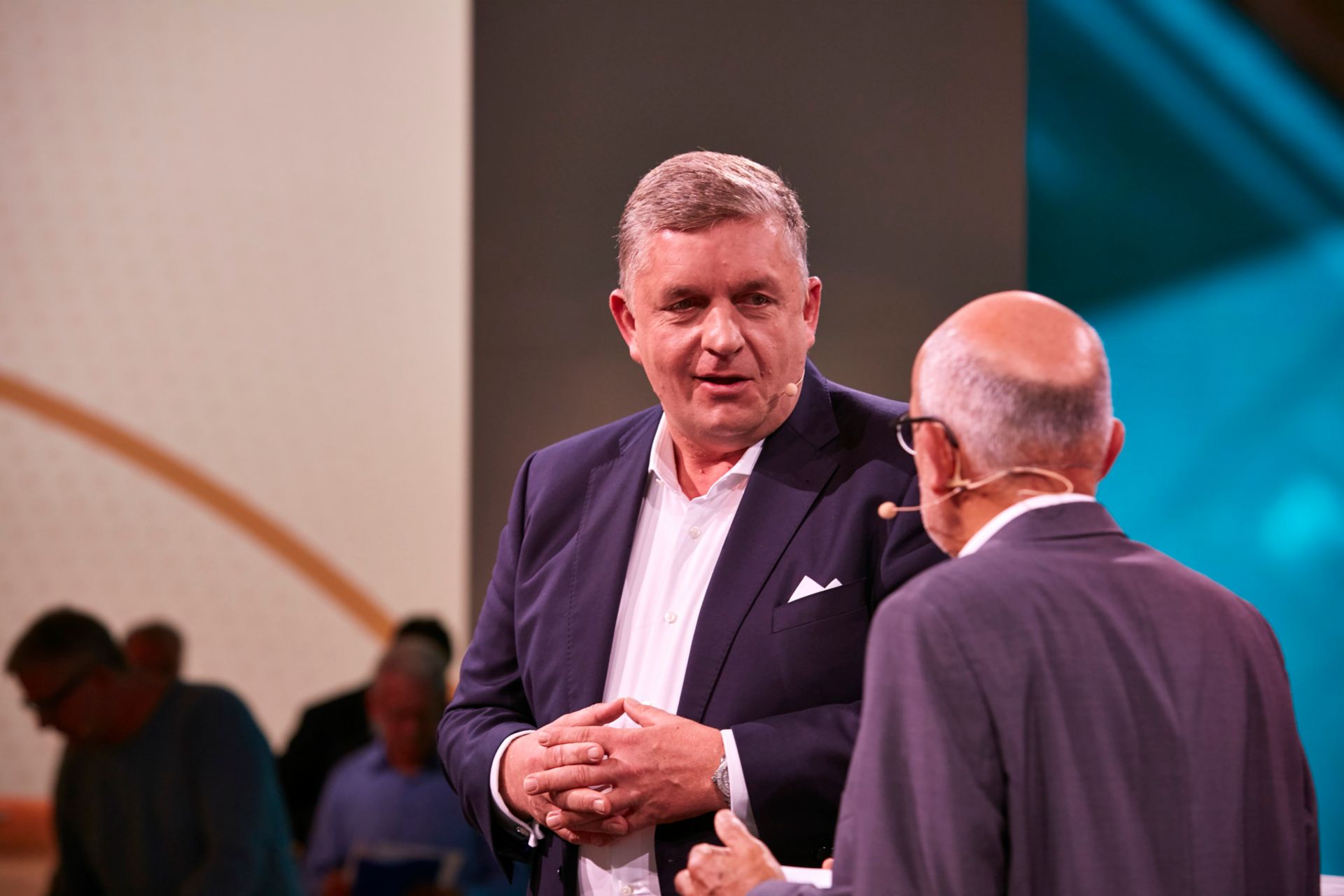Hanover, Sept. 23rd 2018. The shortage of professional drivers in the transportation industry is more and more becoming a problem. This has a negative impact on business in Germany and Europe. The lack of drivers increasingly impedes the smooth transportation and timely delivery of raw materials and goods. The progress in vehicle technology in assistance systems and in the digital network of the logistics chain furthermore requires a more qualified training of drivers. The TRATON GROUP, formerly Volkswagen Truck & Bus, addressed this issue in a Forum "Future of the driver" at the IAA on the weekend.
Holger Mandel, Chairman of the MAN Truck & Bus Deutschland Board of Directors, captures the harsh reality in a nutshell: “Germany is seeing 30,000 drivers a year retire,” he says, “and they are being replaced by only 16,000 drivers per year.” He paints the picture for this Christmas to come: “Punctual delivery of parcels and packages could be a problem.”

Germany is currently lacking 45,000 drivers already. Mandel predicts that it could soon be 100,000, and maybe even 200,000 in the future: “This is an enormous challenge for everyone involved.” After all, transportation is the backbone of the economy and the foundation of our quality of life. He cites an example: “When drivers in Brazil were on strike, the shops were empty after just a few days.”
Policymakers, truck industry, logistics, drivers, federations, and practitioners: the TRATON Talk panel discussion chaired by industry expert Werner Bicker at the IAA Commercial Vehicles trade fair is as diverse as the worsening driver crisis. Trucker Axel Flaake does not mince his words: “The situation is hardly surprising: the lack of respect with which drivers are treated is terrible.” And he adds: “The situation on the roads, in parking lots, and in sanitary facilities is almost degrading.” Decisive steps need to be taken against this.
Policymakers represented by Udo Schiefner, Member of the German Bundestag and the SPD party’s Deputy Transportation Policy Spokesman, are calling for regulations and an image campaign aimed at improving the way drivers are seen. Schiefner says that since the poor image is also due often enough to companies on the road at dumping prices, the difficulties in competition within Europe should also be addressed. “Talking is not enough — we need to act,” he determines in his statement.
By contrast, the logistics industry, represented by Thomas Zernechel, Head of Volkswagen Group Logistics, has confidence in the market. There are good reasons for not choosing the cheapest carrier. In addition to this, transportation prices are already starting to increase. A look at the A2 in Hanover is enough to see the blatant irregularities on the roads.
Logistics service provider Hubertus Kobernuß agrees that it cannot just be down to driver wages: he reckons that a driver today could earn “€3,000 and above” again. The driver would have to have a few qualifications for this, of course. Especially if they are transporting more demanding cargo, such as in tank or silo transportation.
Yet it is in these very areas that it is even more difficult to fill positions, summarizes Kobernuß. “I do not understand why a driver would rather be driving pallets in standard transportation than enjoying the nice life of a silo driver. And at a poorer wage.”
However, he does say that the demands on the drivers of today are huge: “The drivers of today are ideally supposed to be chemists, legal experts, engineers and a few things more,” he adds, describing the growing expectations of truck drivers.

Is there something badly wrong with the training? “No,” says Jörg Mannsperger from Dekra Akademie and urgently recommends “not making the barrier to entry too high” to refrain from making the shortage worse. That being said, it is also clear that there is no future for those who are unable to overcome their aversion to digitalization. He believes that in general, the importance of hands-on training is growing when it comes to training drivers.
There is a broad consensus regarding the main causes: one is the poor image that all those involved in the logistics chain should tackle together. The other is the appalling conditions on the roads, in parking lots, and in sanitary facilities, coupled with increasing qualification requirements, and a remuneration that is not always appealing.
The discussion, which also saw statements from trucker blogger Maik Erdmann and IRU General Delegate Matthias Maedge alongside a contribution from Claudia Ball (Dekra Akademie) and an analysis from independent journalist Jan Bergrath, established the following: It is not the truck itself that makes the job less appealing and makes it difficult to attract new drivers to the profession. And there is no doubt about the prospects of drivers — digitalization might make the job more demanding but it will not replace them.
However, there are no simple solutions for the shortage of drivers. The issue requires close collaboration that goes far beyond the logistics industry. “We need a round table for this and we need it now so that road transportation can continue to hold on to its role as the most efficient means of transportation,” says MAN Deutschland Chairman Mandel.
Contact:
Julia Kroeber-Riel
Head of Group Communications & Governmental Affairs
TRATON AG
Dachauer Str. 641
80995 München
Tel.: +49 152 58870900
julia.kroeber-riel@traton.com
Dr. Alexander Baer
Trade Media Relations
TRATON AG
Dachauer Str. 641
80995 München
Tel.: +49 152 58867423
alexander.baer@traton.com
About TRATON:
TRATON AG, formerly Volkswagen Truck & Bus AG, is a wholly-owned subsidiary of Volkswagen AG and a leading commercial vehicle manufacturer worldwide with its brands MAN, Scania, Volkswagen Caminhões e Ônibus, and RIO. In 2017, TRATON GROUP’s brands sold around 205,000 vehicles in total. Its offering comprises light-duty commercial vehicles, trucks, and buses which are produced at 31 sites in 17 countries. The Company had a workforce of around 81,000 worldwide across its commercial vehicle brands as of December 31, 2017. The Group seeks to transform the transportation system through its products, its services, and as a partner for its customers.
